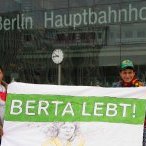English · Español

6 May 2016 | News | Free Honduras | Human rights | Berta lives on!
Against the privatization of life
Members of COPINH and daughter of Berta Cáceres claim justice and denounce responsibility of European countries during tour
Download: MP3 (2.6 Mb)
On Tuesday, April 3, the organization “Entrepueblos” organized in Valencia, Spain, the talk “Justice for Berta, Struggles and Resistance in Honduras” with the presence of Berta Zuñiga Cáceres, daughter of Berta Cáceres and Rosalina Domínguez, both members of the Council of Popular and Indigenous Organizations of Honduras (COPINH). Berta and Rosalinda, together with other members of COPINH visited five European countries from April 19 to May 6 as part of an international campaign to seek truth, justice and to clear up the murder of the leader Berta Cáceres.
On April 20, Berta Zuñiga appeared at the European Parliament´s Subcommittee on Human Rights, based in Brussels, Belgium, to demand the creation of an international independent investigation commission. This activity was followed by several days of participation in demonstrations, media coverage, meetings with authorities and social organizations and even a posthumous award granted to Berta Cáceres: the Ecozine 2016 Award granted by the International Film and Environment Festival of Zaragoza.
At the activity in Valencia, the daughter of Berta Cáceres shared an analysis on the political and economic context of her country and she explained why it is the most dangerous territory in the world for environmental defenders. “The Honduran government is too weak to protect human rights, but it is strong to ensure the protection of private interests. Honduras is part of the Meso American Plan for the creation in Meso America of an electrical interconnection corridor to meet with the energy needs of the industry, hotels, factories, but also the energy needs of the US. This is an updated version of the Puebla Panama Plan”.
Berta Zuñiga also denounced other processes for the privatization of the Honduran territory: “we also have special economic development areas, which are the biggest expression of privatization, where whole private cities are built. One is focused exclusively on tourism, another one on the energy production issue, others are cities for textile production”.
The advance of these projects goes hand in hand with an increase of the repressive forces of the country, pointed out the activist: “In addition, there is a strong militarization in the country, where security forces have appeared, such as Los Tigres, Los Cobras, the Military Police, among others. These operate in areas of conflict where peasants struggle against land grabbing and monoculture plantations, but also in indigenous regions that struggle against these projects installed by force, without consultation and in the framework of a coup d´Etat”.
As one of the strategies of struggle at international level, the activist talked about the pressure on those who finance these projects, making specific reference to DESA company, in charge of the Agua Zarca project. “We think that pressure needs to be exerted on the financial institutions involved, which in the case of the FMO and Finnfund, these are mostly owned by the Netherlands and Finland governments. And it is really shameful that countries that claim to be committed with human rights, such as the Netherlands and Finland, now carry the burden of the irresponsibility of these financial entities”.
Imagen: https://scontent-gru2-1.xx.fbcdn.ne







